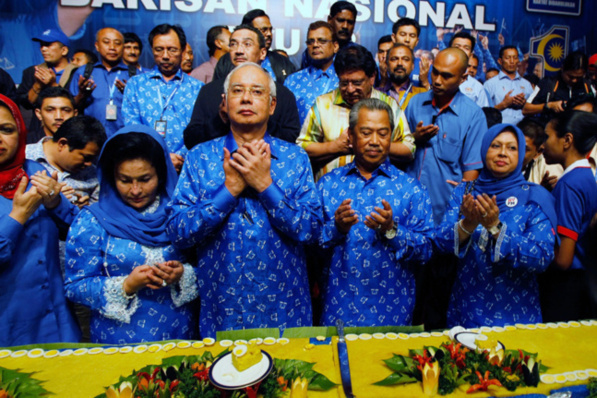
Malaysia's Prime Minister Najib Razak (second from left) celebrates his victory with a prayer on election day in Kuala Lumpur, Malaysia. Photo -- Nicky Loh/Getty Images
The three-party coalition dominated by the United Malay Organization (Umno), came out once again weakened from its confrontation with the opposing coalition. The Pakatan Rakyat and its leader, former Chancellor of the Exchequer Anwar Ibrahim, had indeed already stolen the absolute majority in 2008 enjoyed by the Prime Minister Najib. Today, the results are being challenged, there are numerous allegations about electoral fraud and Najib Razak must deal with promises of reform which were made.
This electoral "defeat" is a particularly heavy burden to bear as Mr Najib coalition had considerable financial resources and massive support from state-controlled media. Allegations about corruption weighing on the government as well as the restrictions imposed on the freedom of press have certainly decreased the support enjoyed by the Najib government. Not to mention the affirmative action policies favoring Malaysian people over Chinese and Indian minorities, which compromised the chances of Barisan Nasional to keep all power levels.
In May 1969, following violent riots against the stranglehold of the Chinese minority over the Malaysian national economy, Malaysia was going through a transition period leading the Najib Razak party to power (at that time led by Tun Abdul Razak). The fear of ethnic conflicts between the Malay Muslim majority and Chinese and Indian minorities enabled the establishment of a new economic policy (NEP) recognizing the importance of Malaysian citizens in their economy. Many affirmative action policies (quotas in universities, government discounts on houses, favoritism in Public Service, etc.) were then introduced to allow Malaysian people to control 30% of their economy by 1990. Over time, this way of perceiving the different ethnic communities living in Malaysia has left heavy scars. Indian and Chinese communities are sometimes considered as second-class citizens and have difficulty integrating the rest of the population. Today, this practice is being challenged by the large urban population feeling no longer the use of these policies, but also by the continuing exile of Chinese and Indian people who leave the country due to a lack of opportunities.
Elections: is there a real winner?
The elections backdrop was therefore ethnic, political and religious. The results of the confrontation between the rising star Anwar Ibrahim and seasoned veteran Najib Razak were likely to be tight and risks of Barisan Nasional to be defeated were real. The coalition appears politically weakened after the elections with 133 seats collected over the 222 at stake when it had won 140 in the general election of 2008. It is by flattering voters in rural areas, promising major reforms, and possibly by some electoral antics, that Mr. Najib has managed to stay in power. The electoral fraud allegations weighing over the Barisan Nasional have already gathered more than 40,000 opponents in Kuala Lumpur three days after the elections. Demands for reforms regarding the political process, control of the media and the role of minorities in the economy are more insistent.
On this last point, attributing his “defeat” to the “Chinese tsunami”, the Prime Minister turns a blind eye to all the issues that go beyond ethnic rivalries between the Malaysian people (60% of the population) and Chinese people (25% of the population ), on top of arousing these rivalries. Within the ruling coalition itself, Najib Razak’s place is compromised. By collecting only 47% of the popular vote, he cannot guarantee his position as leader of the Barisan Nasional. The pressure is increasing in Malaysia and profound changes are expected.




























